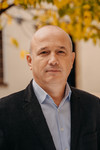People
 Jiří Lach is Head of the Department of Politics and European Studies, professor of History and political scientist. He is a guarantor of the English doctoral program Political Science and graduate MA programme War and Peace Studies fully taught in English. Among courses he teaches in MA programmes are e. g. Evolution of International System; Nation, State and Revolution; Genocides in the world from 1915 until present.
Jiří Lach is Head of the Department of Politics and European Studies, professor of History and political scientist. He is a guarantor of the English doctoral program Political Science and graduate MA programme War and Peace Studies fully taught in English. Among courses he teaches in MA programmes are e. g. Evolution of International System; Nation, State and Revolution; Genocides in the world from 1915 until present.
His field of expertise is genocide, contemporary history of Europe, Czech historiography in the 20th century, Development of political system and international relations in the 19th and 20th centuries.
 Daniel Marek is Associate Professor of European Politics at the Department of Politics and European Studies, Palacký University, Czech Republic. He has studied at Palacký University (Czech Republic), University of Umea (Sweden), UCLA (USA), and Hull University (UK). He taught Central European and EU politics at universities in the Netherlands, the UK, and the USA. His teaching and research interests include European Union politics, policies, Central European politics, and Transatlantic relations. European politics.
Daniel Marek is Associate Professor of European Politics at the Department of Politics and European Studies, Palacký University, Czech Republic. He has studied at Palacký University (Czech Republic), University of Umea (Sweden), UCLA (USA), and Hull University (UK). He taught Central European and EU politics at universities in the Netherlands, the UK, and the USA. His teaching and research interests include European Union politics, policies, Central European politics, and Transatlantic relations. European politics.
He is a co-author of Cohesion Policy in the European Union (Palgrave Macmillan, 2014) and The Czech Republic and the European Union (Routledge, 2011) and co-editor of EU Cohesion Policy after Enlargement (Palgrave Macmillan, 2008) and The New Member States and the European Union: Foreign Policy and Europeanization (Routledge, 2013). His other publications include articles on European and Czech politics in the Journal of Common Market Studies, Publius, Europe-Asia Studies, East European Politics, European Politics and Society, Regional and Federal Studies, the Journal of International Relations and Development, and the Journal of Contemporary European Studies.
 Markéta Zapletalová, is the ERASMUS+ academic coordinator for incoming international students registered to study at the Department of Politics and European Studies.
Markéta Zapletalová, is the ERASMUS+ academic coordinator for incoming international students registered to study at the Department of Politics and European Studies.
As Assistant Professor, she teaches courses reflecting on institutions of the European Union, the history of European integration, diplomacy, diplomatic protocol and Italian politics. Her course Institutional Design of the European Union is also open to international students. She is also a Department Coordinator for incoming ERASMUS+ (and other international) students and is in charge of the academic part of a students’ stay. She will thus be helpful in selecting your courses at the DPES and sign your Learning Agreements and any changes thereof. Looking forward to having you here with us!
 Markéta Žídková is Assistant Professor at the Department of Politics and European Studies, Faculty of Arts, of Palacky University in Olomouc. She is in charge of organizing our students‘ stays at universities abroad (proklik https://kpes.upol.cz/zahranici/) and cooperates with the National Model United Nations project in the USA (proklik https://www.nmun.org/).
Markéta Žídková is Assistant Professor at the Department of Politics and European Studies, Faculty of Arts, of Palacky University in Olomouc. She is in charge of organizing our students‘ stays at universities abroad (proklik https://kpes.upol.cz/zahranici/) and cooperates with the National Model United Nations project in the USA (proklik https://www.nmun.org/).
Marketa studied Political Science and European Studies at Palacky University in Olomouc (Master’s degree and Ph.D.) and International Relations and European Studies at Loughborough University (M.A.). Her field of expertise includes Russian politics and post-Soviet space, and the courses she teaches involve the Russian Government; Problems of the post-Soviet World; Conflicts in the post-Soviet Area; Russian State, Nationalism and Minorities; International Relations. She collaborates with the KULTURUS Festival of contemporary Russian independent art and human rights.
 Gokhan Bacik is Professor at the Department of Politics and European Studies at Palacky University Olomouc. His research interests include modern Middle East, Islam and politics, and Turkish politics.
Gokhan Bacik is Professor at the Department of Politics and European Studies at Palacky University Olomouc. His research interests include modern Middle East, Islam and politics, and Turkish politics.
 Hynek Melichar is Assistant Professor at the Department of Politics and European Studies and a Senior Advisor on Foreign and Security Affairs for the Chamber of Deputies.
Hynek Melichar is Assistant Professor at the Department of Politics and European Studies and a Senior Advisor on Foreign and Security Affairs for the Chamber of Deputies.
His expertise is in international relations and security, specifically on the issues of political violence and terrorism in the context of ethno-nationalist conflicts. He is the author of several articles and one monograph. He regularly comments on international security and terrorism on ČT24 and other media.
 Tomáš Lebeda is Associate Professor of Political Science at the Faculty of Arts of Palacký University Olomouc.
Tomáš Lebeda is Associate Professor of Political Science at the Faculty of Arts of Palacký University Olomouc.
He started his professional career at the Institute of Sociology of the CAS and at the Faculty of Social Sciences of Charles University in Prague. He specializes in the field of elections, electoral systems and electoral behaviour. He also focuses on the influence of constitutional and institutional mechanisms on the political process and more broadly the field of comparative empirical-analytical political science.
 Eva Lebedová works as an Assistant Professor at the Department of Political Science and European Studies at the Faculty of Arts of Palacký University Olomouc, where she received her PhD. Her main research interests are political communication, political marketing and campaigns.
Eva Lebedová works as an Assistant Professor at the Department of Political Science and European Studies at the Faculty of Arts of Palacký University Olomouc, where she received her PhD. Her main research interests are political communication, political marketing and campaigns.
 Pavel Šaradín is Associate Professor, a political scientist and lecturer at the Department of Politics and European Studies. He specializes in the party system of the Czech Republic, theories of democracy and local and regional politics. He also tries to popularize political science.
Pavel Šaradín is Associate Professor, a political scientist and lecturer at the Department of Politics and European Studies. He specializes in the party system of the Czech Republic, theories of democracy and local and regional politics. He also tries to popularize political science.
 Daniela Ostrá is Associate Professor at the Department of Politics and European Studies specialising in political branding, political communication and campaigns.
Daniela Ostrá is Associate Professor at the Department of Politics and European Studies specialising in political branding, political communication and campaigns.
 Ľubomír Zvada is finishing his Ph.D. and works as an Assistant at the Department of Politics and European Studies. He coordinates internship programmes.
Ľubomír Zvada is finishing his Ph.D. and works as an Assistant at the Department of Politics and European Studies. He coordinates internship programmes.